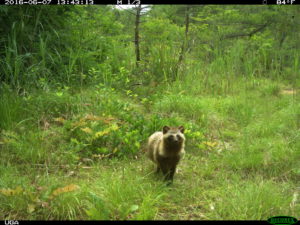Study shows animal life thriving around Fukushima
By University of Georgia
1/6/2020

Photo credit: University of Georgia
Nearly a decade after the nuclear accident in Fukushima, Japan, researchers from the University of Georgia have found that wildlife populations are abundant in areas void of human life.
The camera study, published in the Journal of Frontiers in Ecology and the Environment, reports that over 267,000 wildlife photos recorded more than 20 species, including wild boar, Japanese hare, macaques, pheasant, fox and the raccoon dog—a relative of the fox—in various areas of the landscape.
UGA wildlife biologist James Beasley said speculation and questions have come from both the scientific community and the general public about the status of wildlife years after a nuclear accident like those in Chernobyl and Fukushima.
This recent study, in addition to the team’s research in Chernobyl, provides answers to the questions.
Read more here: https://srel.uga.edu/study-shows-animal-life-thriving-around-fukushima/